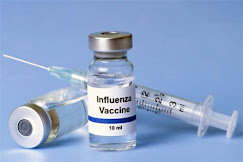Getting annual flu shots or nasal sprays gives children broad protection against many variants of influenza, study finds

Photo from Washington University in St. Louis
—–
Children who receive year after year of season-specific influenza vaccines develop antibodies that also provide broader protection against new strains of flu, including those capable of causing pandemics. Adults do not possess this ability.
So says a study published in the journal Cell Reports Medicine, which could spur development of a universal flu vaccine for children. They are especially vulnerable to serious complications from flu, such as pneumonia, dehydration and, in rare cases, death.
Unfortunately, as children grow older, they become less capable of producing broadly protective antibodies due to repeated exposure to influenza through infection or vaccination, the researchers from McMaster University in Ontario found. They spent three years studying immune responses in children between the ages of 6 months and 17 years.
Influenza has faded in the last two years due to preventive measures against Covid-19, such as distancing and masking, Miller warns the flu will return, possibly in dangerous forms. Influenza has caused five pandemics in the last 100 years. The so-called Spanish flu of 1918-20 killed about 50 million people, 2.7 percent of the world’s population of 1.8 billion at that time.
“This is an important finding because it means we have flexibility in terms of the type of vaccines we can use to make a universal vaccine for children,” Miller said. “We now know that children’s immune systems are much more flexible than adults’ when it comes to being able to teach them how to make these broadly protective responses.”